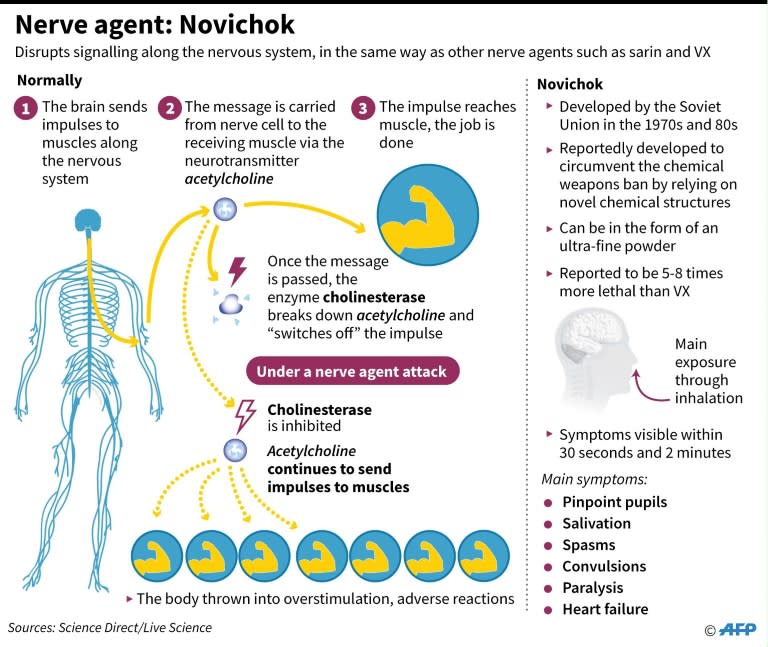What we know about Russia's Novichok nerve agents
The British government believes a "Novichok" Russian nerve agent was used for the attempted assassination of Russian double agent Sergei Skripal and his daughter on March 4. Here's what we know about the chemical weapon. - What is it? - Novichok -- or "newcomer" in English -- refers to a group of powerful and deadly chemical compounds reportedly developed by the Soviet government in the 1970s and 1980s, some of which were adopted by the Soviet army in 1990. Almost everything in the public domain comes from Russian defectors who revealed the existence of the secret weapons programme in the 1990s, including a former chemist who wrote a book about them. The Novichok agents are believed to have been created by Soviet authorities at the State Scientific Research Institute of Organic Chemistry and Technology. The aim appears to have been to circumvent international conventions banning chemical weapons by developing compounds with new structures that would escape detection, experts say. "The exact science and mode of action of Novichok agents is not fully understood at this point as these are the 'newest' class of nerve agents," said Michelle Carlin, a specialist at Northumbria University in northern England. Russian President Vladimir Putin declared in September that Russia had eliminated all of its declared chemical weapons. - How would a Novichok agent have been used? - The British government has not revealed how the nerve agent was administered to the Skripals, but a Russian whistleblower said it would have "probably" been deployed in an aerosol. The agent is an ultra-fine powder, made up of several components that would have been mixed safely by the assassin or assassins beforehand. "It can be delivered in many ways but it was probably given in an aerosol can," Vil Mirzayanov, a defector from the programme, told Britain's Daily Mail newspaper. The Skripals were found poisoned on a park bench in the city of Salisbury after visiting a pub and restaurant. British authorities urged anyone who had visited the same places to wash their clothes and possessions afterwards, suggestion a large area could have suffered low-level contamination. - How does Novichok work? - All nerve agents, such as the better known VX and Sarin as well as the Novichok chemicals, attack the informational loop in the body between the brain and muscles. The brain sends impulses through the nervous system to control muscles around our bodies using a chemical called acetylcholine. This is known as a neurotransmitter. Once the message is passed on to the muscle by acetylcholine, leading to a contraction and a movement, an enzyme called acetylcholinesterase breaks down the transmitter and the muscle then relaxes. A nerve agent inhibits the work of this enzyme, meaning that muscles become uncontrolled, leading to spasms and excessive salivation initially, before paralysis and ultimately death through asphyxiation or heart failure. - How is Novichok different? - The main difference appears to be its strength, which experts believe to be several times stronger than VX and Sarin. "This is a more dangerous and sophisticated agent than sarin or VX and is harder to identify," said Gary Stephens, a pharmacology expert at the University of Reading near London. Mirzayanov, the defector, said it was "at least 10 times more powerful than any known nerve agent. Plus practically it is uncurable." He told the Daily Mail: "These people are gone -- this man and his daughter. Even if they survive they will not recover." The problem for medics treating the Skripals is that they are unlikely to know which treatment to give to counter-act the nerve agent and restore the enzyme and normal muscle functions. "Clinicians may have had to make an intelligent guess," added Alastair Hay, a professor and specialist at the University of Leeds in England. A policeman who found the Skripals was treated in intensive care afterwards, but is now able to sit up and speak. - Has Novichok ever been used before? - Speaking to the British parliament on Monday, Prime Minister Theresa May said Russia was known to have used Novichok before but she gave no more details. The Russian newspaper Kommersant reported one case of a Novichok agent being used in a criminal act in 1995 when assassins killed a businessman and his secretary by contaminating his telephone. The case, if confirmed, would add to questions about whether stocks of the chemical could have fallen into criminal hands via corrupt agents at the research institute during or after the collapse of the Soviet Union. Mirzayanov said he found it "unthinkable" that another country or non-state actor could have had access to the chemical weapon or the expertise to manufacture and deploy them. "Only Russia could do this," he said. Other theories that could absolve Russian President Vladimir Putin of responsibility include rogue elements within the security sources carrying out the hit on Skripal without authorisation.



